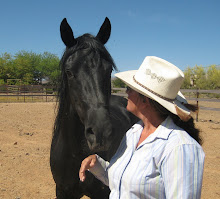My blog now resides on my newly designed website.
Come over for a visit to ExceptionalHorsemanship.com - read more of the same great training tips you've enjoyed. And, learn much more about our services.
Come to Exceptional Horsemanship and enjoy the ride!
Tuesday, April 20, 2010
Sunday, April 11, 2010
BLAME
Whose fault is it?
In a nutshell... Yours!
What is so ding-dang hard about taking the blame for something that didn't go as you wanted with your horse? I really have a hard time understanding people's resistance to this.
1) It didn't go as you wanted. So, you either had too high expectations for the level of training that EITHER you or your horse have. That's your fault for expecting more than you're capable of delivering.
2)Your level of skill isn't good enough. Again your deal. It doesn't mean you're a bad person. It just means that your level of skill isn't good enough to accomplish that in that moment. Or... ever if you don't learn from it. So what? And So What?
3)Your horse's skill level or training wasn't sufficient to accomplish it. Again, yours. Does the horse need to perform the skills YOU want for his horsenal needs? No. If his skill level isn't up to the task, you haven't gotten him there in whatever means you had available.
Try this for a while. It will become easier the more you practice (just like anything). When something isn't going as planned, start your sentence in one of these ways: I should have... or, I shouldn't have... Just give it a shot. Get your ego out of your own way.
Thursday, April 8, 2010
Training Youngsters
Many people think it's important to let a horse be for the first 2-4 years. While that's great if they're in the wild or out in a pasture with the herd, make no mistake. If you're taking that horse from the stable/stall/pen to the turn out and back, or grooming him, washing, trimming hooves... you're training him. Probably not the things you want to train him for, but training him none the less.
Choose wisely. You don't have to be riding or have him be of ridable age to train him. If you lead him even once, you either do it how you'd like it or how he'd like it.
Tuesday, April 6, 2010
FUSCILING
My word. Yes, I love to invent words. Fusciling (verb)- some combination of raising the movement, energy, expectation, signal and agitation in order to allow the horse to find his way to calmness.
Many people inherently and because they're taught it constantly, behave in a calm and quiet manner with horses. All well and good you may say. However, two things happen. 1) The horse learns that people SHOULD behave calmly and quietly and then when they don't, all hell breaks loose. 2) Horses learn to train their people that if they don't behave quietly, horse will throw a fit and then insist that person attempt to calm them with cooing noises, petting and treats. This in turn teaches a horse that he is rewarded on several levels when he behaves badly. This doesn't mean that the horse wants to lose his mind just for a carrot, but they learn that flying off the handle isn't uncomfortable for them.
So, what would cause a horse to choose good behavior when they get rewarded for less than desirable behavior?
Nothing!
If you don't deliberately put your horse in a position to learn not to react inappropriately, he will get more and more reactive. Not less. People who have been trained by their horse not to agitate him will still have an agitated horse. "Easy boy" doesn't stop him unless he decides to stop.
So, fuscil your horse. Make up ways of tipping the apple cart. Add hurry up, no that way, yes it's a tarp, I changed my mind I mean backward all in the same minute. This will take a bit of practice on your part and creativity. But the dividends it pays are HUGE!
Subscribe to:
Comments (Atom)
